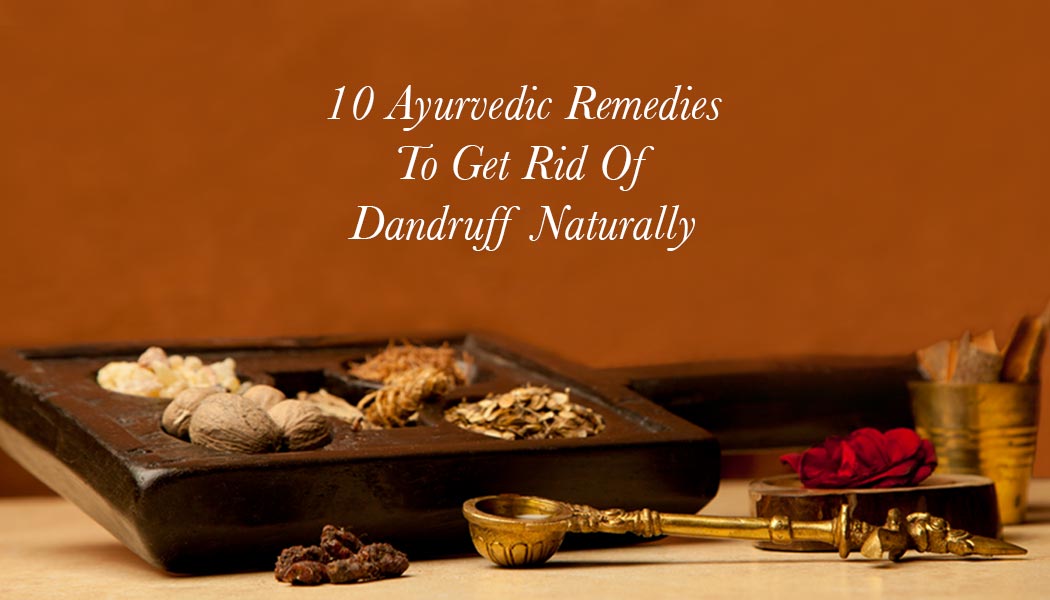As the wonderful spring and summer months pass, some of us genuinely begin to fear the arrival of the winter season because of the horror it brings along, the dreaded D-word - dandruff! Not just winters, but for some people, dandruff is a serious problem all year round. Are you one of them? Then, don’t let your struggle with dandruff make you feel down about your appearance.
Ayurveda has a cure for everything and dandruff is no exception.
Ayurvedic medicine or Ayurveda, a holistic healing system that originated from the Indian subcontinent around 3000 years ago, has many successful home remedies and practices for managing dandruff. In this article, we present our best advice and tips on getting rid of dandruff.
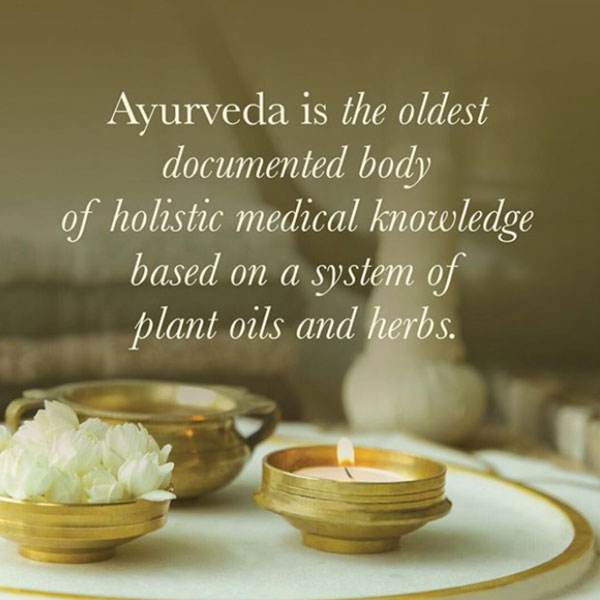
How To Get Rid Of Dandruff Naturally - The Ayurvedic Practice of Hair Oiling
Well, now we all know our grandmothers were not playing around when they scolded us for not oiling our hair! Ayurveda reminds us that everything is linked to the larger universe, and hence nature is where all solutions lie. When done properly, oiling the hair with natural oils has excellent benefits for those who suffer from dandruff.

Whether you have an oily or a dry, flaky scalp, there are plenty of hair oil options to help you remove dandruff naturally and give you smooth, bouncy hair that can rival the best. We have studied various oils that are available in nature that can treat every possible hair problem. Here are our best picks for managing dandruff.
1. Neem Oil For Anti-Fungal Treatment of Dandruff
Ancient Ayurvedic texts describe the Neem tree as ‘Sarva Roga Nivarini’, which means Universal Healer or curer of all Ailments. Neem oil derived from this tree is very potent with antiseptic, antiviral, antibacterial, and antifungal properties.
The primary cause of dandruff is fungi known as Candida and Malassezia. The anti-fungal properties of Neem oil make it effective against these fungi. You can also use Neem oil to relieve inflammation, itchiness, and irritation that results from dandruff.
For those who are prone to dandruff, Neem oil should be used regularly. It also helps in maintaining the pH balance of the scalp, which further prevents dandruff formation.
To use Neem oil to get rid of dandruff naturally, dilute equal parts (50/50) of Neem Oil with Sweet Almond/Sesame Oil and gently massage the oil directly into the roots of the hair and scalp. After allowing it to work for 30 minutes, cleanse your hair with a natural cleanser.
Read - Top Benefits Of Neem Oil For Hair and Skin
Shop For Kama Ayurveda’s Pure, Natural and Organic Neem Oil
2. Bringadi Oil To Fight Dandruff and Hair Loss
Brigandi oil is a combination of Bhringraj oil (extracted from the leaves of the Bhringraj tree) and a few hair-friendly herbs like Amla, Indigo, Sesame. and Balloon Vines. This Ayurvedic oil is an intensive hair treatment that helps prevent hair loss, scalp irritation, dandruff, and premature greying.
With its soothing earthy scent, the oil helps in cooling and soothing the scalp. It also provides relief from the itchiness and greasiness caused by dandruff.
To use Brigandi oil to remove dandruff, gently massage Brigandi oil into hair, ensuring that the entire scalp is covered. You can do this once or twice a week. Warm the oil to enhance its benefits further.
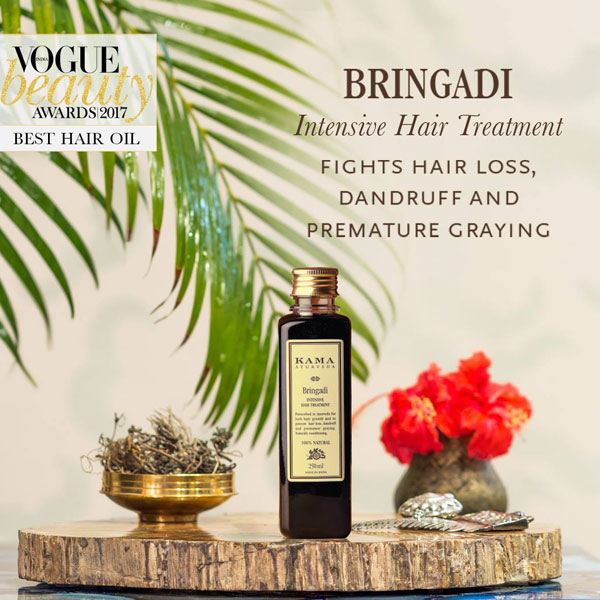
3. Coconut Oil To Remove Dandruff Caused By Dryness
Coconut oil is effective in hydrating the skin and thus, preventing dandruff which is caused due to dryness. Research has found that coconut oil, in particular, can aid in protecting from eczema and relief from the symptoms it brings along - inflammation and itching of the skin.
Some studies also indicate that coconut oil and its compounds have antimicrobial properties. The application of coconut oil to the scalp and hair for eight weeks helped ease the symptoms of dandruff by as much as 68%!
So treat it like a self-care hour before showering, and massage a few tablespoons of coconut oil into your scalp and hair, let it sit for at least 30 minutes, and then hop into the shower!
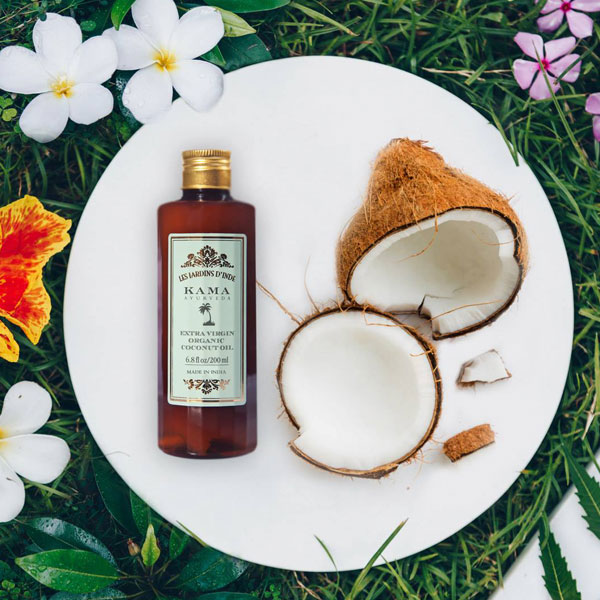
Shop Kama Ayurveda’s pure, natural, and organic Extra Virgin Coconut Oil
Read - Why Is Virgin Coconut Oil So Good For Your Hair?
We have talked about how essential oiling is to maintain good scalp health and get rid of dandruff. Now, let us walk through some other natural remedies and tips that will help you manage dandruff.
How To Get Rid Of Dandruff - 6 Home Remedies And Tips
It is essential to understand that some people are more prone to dandruff, which tends to be a chronic or recurrent disorder with periods of flare-ups. While it may not be permanently curable, it is possible to control and manage it with good hygiene. Here are the home remedies for dandruff treatment -
1. Use Lemon To Manage Dandruff
Yes, lemon, one of the most widely available fruit, can remove dandruff naturally. Lemon juice is incredible for dandruff as it is acidic. Therefore, it breaks down the fungus responsible for causing dandruff. It also helps reduce the oil production of your scalp.
Massage your scalp with two spoon-fulls of fresh lemon juice, and let it sit for a minute, then mix a teaspoon of lemon juice with a cup of water and rinse your hair with it - do this at least twice a week before washing your hair, and you should begin to see good results after the first few washes!
2. Aloe Vera To Get Rid Of Dandruff Naturally
Aloe vera is a succulent that is known to help treat conditions like burns, psoriasis, and cold sores when applied topically. It is widely popular for its medicinal properties and benefits.
Aloe vera contains anti-bacterial and anti-fungal properties. It also helps in soothing the scalp against the inflammation which comes with dandruff. Hence, it is a strong candidate for selecting a remedy for dandruff issues.
You can apply freshly squeezed Aloe Vera gel directly on your scalp, or you can use natural shampoos that contain Aloe Vera.
3. Tea Tree Oil For Dandruff And Dermatitis
Tea tree oil is beneficial for a lot of ailments, and dandruff is one of them. Tea tree oil has antimicrobial and anti-inflammatory properties that may help reduce the severity and symptoms of dandruff.
It is also very effective in fighting the strains of fungus, which cause both dandruff and seborrheic dermatitis.
It is crucial to dilute tea tree oil properly with either water or carrier oil before using it. Otherwise, it can cause irritation, especially for those of us who happen to have sensitive skin!
One way to use Tea Tree Oil for hair is to prepare a hair spray by diluting 5 percent Tea Tree Oil with water or Chamomile Tea. This will condition the hair and also prevent dandruff.
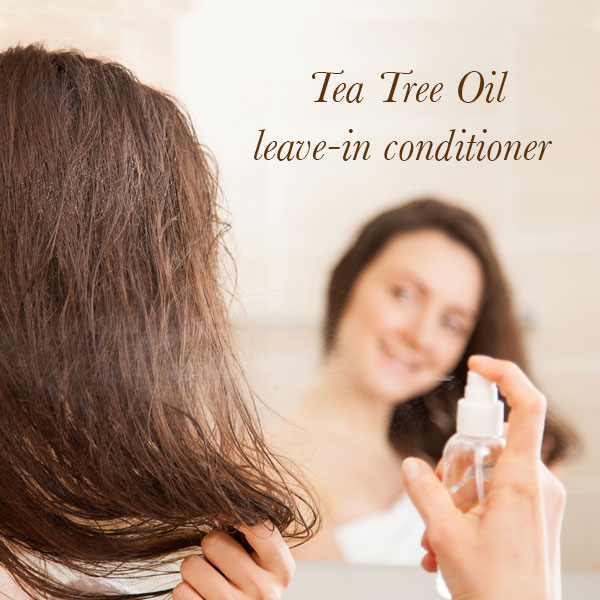
Read - 8 Simple Ways To Use Tea Tree Oil For Healthy Hair
4. Baking Soda To Get Rid Of Itching And Dandruff
Baking Soda is another ingredient that is found in our kitchens. It can be used as an extremely gentle exfoliant to remove dead skin cells and reduce the scaling and itchiness of the scalp.
To use baking soda to remove dandruff, try applying baking soda directly to wet hair and massaging it into your scalp. Let it sit for a minute or two, then continue shampooing your hair as usual.
5. Apple Cider Vinegar Dandruff Treatment At Home
Apple cider vinegar is said to help remove the dead skin cells and balance the scalp's pH. There have been test-tube studies that show that it may prevent the growth of certain types of fungus.
To use it, combine two to three tablespoons of apple cider vinegar with the same amount of water, then put it on your scalp and let it sit for a few minutes before rinsing your hair with clear water or washing your hair with shampoo. You can also add a few drops of Apple Cider Vinegar to your bathtub to restore the pH balance of your body and hair. This may help get rid of dandruff in one wash.
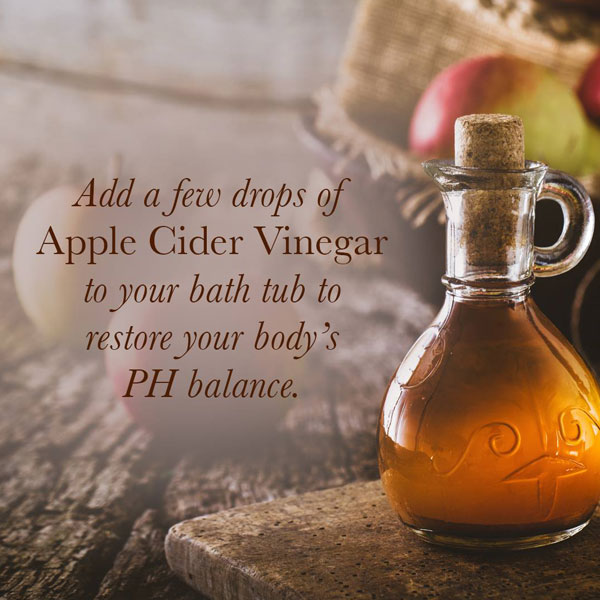
6. Shampoo Your Hair Frequently To Remove Dandruff
Having a regular hair care regime with oiling and washing hair frequently can help immensely get rid of dandruff. As we have explained previously in this article, regularly cleansing the hair and the scalp with a natural shampoo can be life-changing for those who struggle with excessively oily scalp and buildup due to all that oil being produced.
7. Maintain A Healthy Diet For A Healthy Scalp
A balanced diet, especially one rich in fatty acids and probiotics, can be incredibly helpful in reducing dandruff, in addition to maintaining good hygiene and using any necessary products. Also, include plenty of green vegetables in your diet to provide your hair with essential nutrients.
Omega-3 fatty acids are essential to skin health and can help reduce inflammation. A deficiency of Omega-3 fatty acids can cause dry skin, dry hair, and even dandruff. Some fantastic sources of Omega-3 fatty acids are fatty fish like salmon, trout, and mackerel.
If you follow a more plant-based diet, you can also take a fish oil supplement or increase your intake of other omega-3-rich foods like flaxseed, chia seeds, and walnuts.
Additionally, probiotics (beneficial bacteria that are good for your health) can help enhance immune function. They have shown to reduce dandruff severity, along with symptoms of skin conditions like eczema and dermatitis.
While probiotics are widely available in supplement form for convenient consumption, plenty of delicious and healthy foods are rich in probiotics, such as yogurt, kombucha, pickles, sauerkraut, kimchi, and many more - so take your pick!
Now that you’ve browsed through all home remedies for dandruff, you might be curious to know what dandruff is. In the coming section, we’ll answer some of your most common questions about this hair problem, starting with the most basic one -
What Is Dandruff?
‘Dandruff’ - also known as ‘Dermatitis’ or ‘Seborrhea’ - is a highly prevalent skin condition experienced by most people at some point in their lives, regardless of ethnicity, age, or gender.
Dandruff usually appears as fine, dry, and flaky skin on the scalp. It can sometimes have areas with red or pink skin, signaling inflammation. For some people, it may also simply show up as white flakes without any scratching or irritation. For others with more advanced cases, the symptoms may include burning and itching along with white, flaky skin.
Dandruff condition isn't limited to the scalp. Eyebrows, ears, beard (for men), and the hairy part of the chest (for both men and women) can also get dandruff. You might not know this, but dandruff also affects babies in infancy. Dandruff on the scalp of babies is known as a ‘cradle cap’.
Certain kinds of weather can make dandruff worse for you. For some people, it’s the humidity, while for others, it’s the dry winter season that triggers the appearance of dandruff.
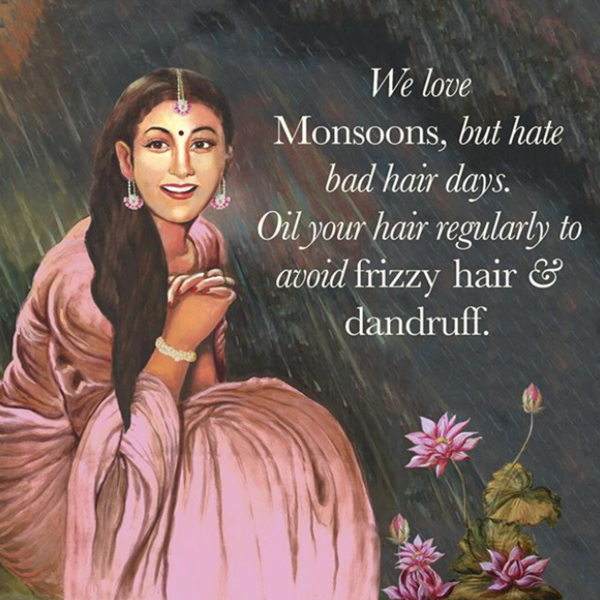
What Are The Causes Of Dandruff?
At some point, you must have thrown your hands up in exasperation at some point and wondered - ‘WHAT did I ever do to deserve all this dandruff? Why me?!’ - we’re going to stop you right there, the thing is, the exact cause of dandruff remains unknown.
Probable causes and associations of dandruff include increased oil production and secretion, dry skin, sensitivity to hair products, and the growth of a yeast-like fungus called ‘Malassezia’, which feeds on oils the scalps of most adults.
Dandruff may also be triggered or worsened by poor hygiene and infrequent hair washing. It has been determined that dandruff tends to affect way more men than it does women, this could have something to do with men’s skin producing more oil than that of women.
Dandruff is also common in people with chronic illnesses such as Parkinson’s disease or a compromised immune system (as in the case of advanced HIV/AIDS), however, it is not contagious.
How Does Dandruff Affect Your Health?
Additional problems can come along with the usual white flaky skin shedding all over your sweaters for people who struggle with dandruff for extended periods. Here are some of the effects dandruff can have on your body -
Acne: Dandruff could be responsible for that sudden outbreak of pimples. When you deal with dandruff and your hair strands come in contact with your face, it can induce pimples. We advise you to avoid haircuts or hairdos that require your hair to be in constant touch with your forehead or cheeks while you work on getting rid of dandruff from the scalp.
In addition to hairstyle changes, washing your face with a facial wash containing Salicylic Acid - at least once a day - can help clear up the acne caused due to dandruff and its fallout on the skin on the face.
Hair Loss: Loss of the hair on the scalp can sometimes happen to people with severe cases of dandruff. It is often connected to the fervent scratching brought on by the itchiness caused by dandruff and extreme dryness. The hair strands and their follicles become damaged with the prolonged traction (the scratching), resulting in the hair strands breaking and falling off.
So, what can be done? Well, first of all, avoid scratching! Secondly, follow a hair care regime of oiling your hair and use an anti-dandruff shampoo to reduce dandruff gradually.
To relieve the itching and dryness, you can also massage some aloe vera gel or some coconut oil (or mix them up together, even better!) onto your scalp and hair.
Both the aloe vera gel and coconut oil contain antifungal and antibacterial properties and are effective against dandruff themselves, so along with hydrating the scalp, this scenario would be the best of both worlds for the scalp!
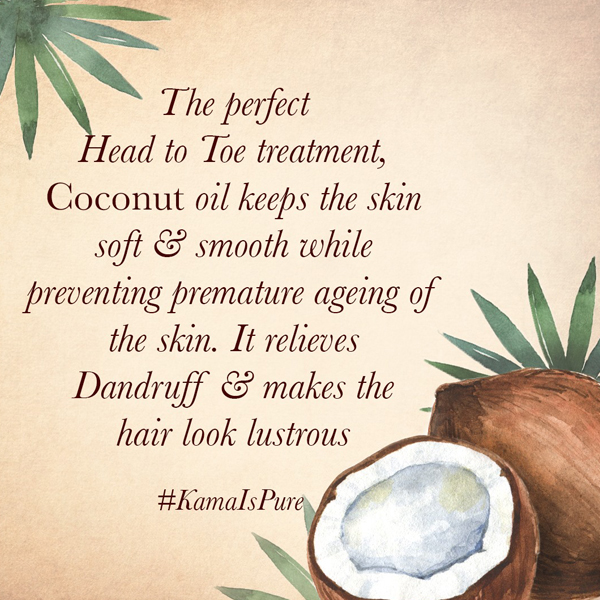
Read - How to Stop Hair Fall - 36 Best Tips And Home Remedies
In a case like such, using tea tree oil along with your shampoo can work wonders for the scalp! Tea tree oil is well-known for its ability to reduce greasiness and itchiness quite significantly in people who suffer from these symptoms due to their dandruff.
As mentioned before, it is crucial to dilute tea tree oil with equal amounts of water or another carrier oil. Applying undiluted tea tree oil can lead to problems, especially if you have sensitive skin.
Itchy and Greasy Scalp: Sometimes, the onset of dandruff can result from the buildup caused by too much oil production by the scalp. This can lead to a dandruff problem along with the itchy and extremely greasy scalp and hair.
In a case like such, using tea tree oil along with your shampoo can work wonders for the scalp! Tea tree oil is well-known for its ability to reduce greasiness and itchiness quite significantly in people who suffer from these symptoms due to their dandruff.
As mentioned before, it is crucial to dilute tea tree oil with equal amounts of water or another carrier oil. Applying undiluted tea tree oil can lead to problems, especially if you have sensitive skin.
Psoriasis: Psoriasis is caused by the body’s immune system and presents similarly to dandruff - it causes flake-off as dandruff does. However, Psoriasis patches can spread past your hairline to your forehead, down your neck, and to the skin on and around your ears. Psoriasis can be identified by its scaly and pink or reddish appearance, often covered by grey, scaly skin.
Eye Problems: Severe cases of dandruff can cause issues for the forehead and the eyes. For instance, Seborrheic Blepharitis is an infection of the eyes caused by dandruff of the scalp and eyebrows. It presents as greasy flakes or scaly patches around the base of the eyelashes and mild to moderate redness of the skin around the eyes.
Along with treating dandruff on the scalp, you can try applying warm compresses to the eyes to loosen up the crusty skin. You can also mix some fragrance-free baby shampoo along with some water and gently scrub the eye area with a gentle cloth or cotton swab dipped into the shampoo solution, then rinsing away with clear water.
If your infection persists, seek professional help as soon as possible. The eye and its surrounding area are highly delicate and may become severely damaged if left untreated.
Other Frequently Asked Questions About Dandruff
1. How to cure dandruff permanently?
Dandruff can’t be cured permanently. However, most people are able to reduce dandruff in the long term with the right hair care. Usually, the flakes come and go. Home remedies and natural hair products are helpful in managing dandruff and related symptoms like itchiness.
2. Is there an Ayurvedic treatment for dandruff?
Ayurveda recommends regular hair oiling to control dandruff. You can use a suitable hair oil depending on your hair type. Neem Oil, Coconut Oil, Brigandi Oil, and Tea Tree Oil help with natural dandruff removal.
3. Which hair mask for dandruff is the best?
Add a few drops of Tea Tree Oil to Aloe Vera gel to prepare a natural hair mask that works as an effective dandruff solution.
Conclusion
We have finally reached the end of this article covering all types of dandruff treatments at home. We’ve also covered all the hair problems associated with dandruff and some ways to manage the sane. Choose the remedies that seem right for your hair type. If you need further help with your dandruff, you can book a free consultation with our Ayurvedic beauty experts.
The advice mentioned above in the article is successful for most people if followed correctly and consistently. However, if your case of dandruff is severe and is not getting better even after using these methods to get rid of it, we strongly urge you to consult a dermatologist.
References:
- 1. Study depicting Antifungal Activity of Aloe Vera Leaves - https://pubmed.ncbi.nlm.nih.gov/17336466/
- 2. Melaleuca Alternifolia (Tea Tree) Oil: A Review of Antimicrobial and Other Medicinal Properties - https://pubmed.ncbi.nlm.nih.gov/16418522/
- 3. Role of Antifungal Agents in the Treatment of Seborrheic Dermatitis - https://pubmed.ncbi.nlm.nih.gov/15663338/
- 4. Antifungal Activity of Sodium Bicarbonate Against Fungal Agents Causing Superficial Infections - https://pubmed.ncbi.nlm.nih.gov/22991095/
- 5. Study on Omega-3 Fatty Acids and Inflammatory Processes - https://www.ncbi.nlm.nih.gov/pmc/articles/PMC3257651/
- 6. Study observing the Positive Benefit of Lactobacillus Paracasei NCC2461 ST11 in Healthy Volunteers With Moderate to Severe Dandruff - https://pubmed.ncbi.nlm.nih.gov/28789559/
- 7. Study observing the effect of Topical Virgin Coconut Oil on SCORAD Index, Transepidermal Water Loss, and Skin Capacitance in Mild to Moderate Pediatric Atopic Dermatitis - https://pubmed.ncbi.nlm.nih.gov/24320105/
